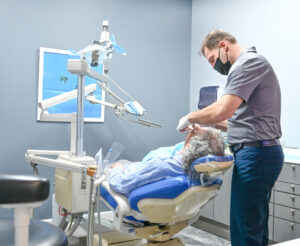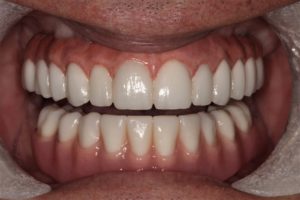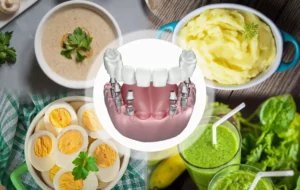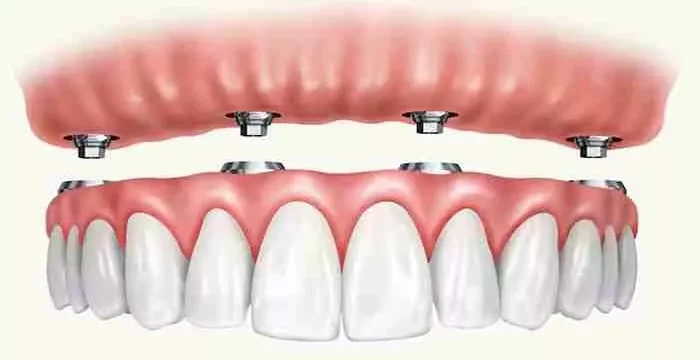
Facing the decision to get dental implants can be daunting. You need clear, balanced information to help you understand the pros and cons of dental implants without getting lost in a sea of overwhelming details. Are dental implants the best option for you? This practical guide cuts through uncertainty, contrasting their long-term benefits like durability and comfort, with the realities of surgical risks and investment. Proceed with our comprehensive exploration to make an informed choice that’s right for your health and lifestyle.
Key Takeaways
- Dental implants offer numerous benefits including natural look and function, oral health preservation, durability, and minimal impact on adjacent teeth, but they require committed care and are more costly upfront compared to other options.
- Risks associated with dental implant surgery include potential infection, nerve damage, sinus issues, and a 5-10% complication rate, with candidacy depending on adequate bone density which can necessitate additional procedures like bone grafting.
- The process of acquiring dental implants is extensive, involving multiple steps, such as consultation, surgery, healing, and restoration, and requires an experienced oral surgeon, with long-term success depending on patient commitment to oral hygiene and regular dental checkups.
The Benefits of Choosing Dental Implants
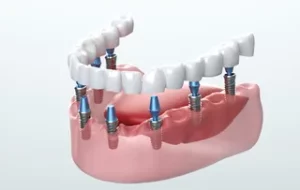
- They enhance eating and chewing experiences, closely resembling natural teeth in function, allowing individuals to enjoy a variety of foods without discomfort.
- Dental implants support oral health by integrating with the jawbone, preventing bone loss.
- They stabilize adjacent teeth to maintain bite and appearance.
Moreover, dental implants offer several benefits, including:
- Preventing facial sagging by maintaining jawbone integrity
- Providing a long-term solution without needing to alter healthy adjacent teeth
- Fulfilling a functional role
- Enhancing aesthetics and boosting confidence in one’s smile
- Proving to be a cost-effective solution in the long run
Lifelike Appearance and Functionality
One of the key advantages of dental implants is their remarkable ability to mirror the look of natural teeth. This feature is a significant advantage, as it ensures that your smile remains as natural-looking as possible even after tooth loss.
But dental implants are not just about aesthetics. They offer functional benefits as they:
- Feel like natural teeth
- Are securely anchored into the jawbone, unlike dentures
- Restore full chewing power
- Can be brushed and flossed just like natural teeth
Implant dentistry makes it possible to replace missing teeth, with natural teeth dental implants being a convenient solution for tooth loss, including cases of a missing tooth, and dental implants pros being a significant factor in choosing a replacement tooth.
Durability and Longevity: The Investment in Your Smile
Dental implants aren’t merely a temporary solution. With proper care, they can last a lifetime. The secret to their durability lies in the jawbone. When an implant is placed in the jawbone, it stimulates bone growth, contributing to the implant’s longevity.
Unlike dentures, dental implants offer better support and stability and do not require periodic refitting. Plus, unlike bridges, dental implants are not subject to decay and do not require neighboring teeth to be altered.
While the attached restorations may need replacement over time, which can incur costs, maintaining dental implants involves regular brushing and flossing, avoiding hard foods, and regular dentist visits.
Oral Health Preservation
One lesser-known advantage of dental implants is their role in preserving oral health. Dental implants support the jaw bone and stimulate new tissue growth, which prevents bone loss and deterioration around the site of missing teeth.
By being placed directly into the jawbone and mimicking natural tooth roots, dental implants offer several benefits:
- They prevent the shrinkage of the jawbone and contribute to preserving facial structure.
- The use of titanium in dental implants enables a unique fusion to bone, offering stability.
- Dental implants prevent adjacent teeth from shifting towards gaps, thereby maintaining proper alignment.
Recognizing the Drawbacks of Dental Implant Surgery
Despite the numerous benefits of dental implants, it’s important to also be aware of potential drawbacks. Dental implant surgery includes inherent risks such as infection, nerve damage, and sinus problems, with complications occurring in a small percentage of cases and an average implant failure rate of about 2%.
Furthermore, dental implants represent a significant financial investment, also requiring considerable time, effort, and diligent at-home care to ensure success. The dental implant process is time-consuming, requiring a long waiting period and multiple appointments, which may be a drawback for individuals seeking quicker solutions.
Financial Considerations: Weighing the Costs
It’s time to discuss the financial aspect. Full-mouth dental implants in the U.S. can cost between $25,000 to $80,000. The overall cost of dental implants includes:
- The initial consultation
- The surgical placement
- Follow-up appointments
- Adjustments
- Any aftercare required
Moreover, the dental crown attached to the implant, which can last 10 to 25 years before needing replacement, also plays a role in the long-term costs. Dental insurance coverage for implants is highly variable, and while some policies offer partial coverage, others may not cover implants at all.
However, some dental clinics, like Rockville Dental Arts in Rockville, MD, provide transparent pricing and may offer payment plans allowing the cost to be spread over a number of installments.
Patients can also explore financing options such as healthcare credit cards, personal loans, or financing through specialized companies to manage the expenses for dental implants. Dental discount plans and assistance programs may provide reduced rates for dental procedures, offering alternative cost-saving options.
Surgical Risks and Healing Time
As with all surgical procedures, dental implant surgery entails certain risks. Some potential complications include:
- Infection risk, which is inherent with any oral surgery and requires proper post-operative care to prevent complications.
- Failure of osseointegration, which is the process of the implant fusing with the jawbone. If this process fails, the implant may not be stable or may cause discomfort.
- Improper placement, which can lead to incorrect fusion or discomfort.
- Additional strain on implants placed in the back of the mouth.
It is important to discuss these risks with your dentist or oral surgeon before undergoing dental implant surgery.
Specific complications such as nerve damage can result in numbness or tingling, while sinus issues can cause inflammation and congestion. Reducing the risk of infections involves maintaining good oral hygiene, scheduling regular checkups, and informing the dentist of any relevant medical conditions.
Also, the healing time for dental implants can last up to six months, ensuring the jawbone solidly surrounds the implant to secure it in place.
Candidacy Requirements for Successful Implants
Dental implants may not be the best solution for everyone, especially in cases of bone loss dental implants. Jawbone density is crucial for the success of dental implants; insufficient density may lead to implant failure.
Adequate bone density is required to support the implant, and if needed, procedures such as bone grafting can be performed to enhance bone structure. In cases of insufficient jawbone for the implant, a bone graft may be necessary to add extra bone to the jaw making implant placement possible.
Dental implants are recommended for individuals with one or more missing teeth, adequate bone density, healthy oral tissues, and who are willing to commit several months to the process. However, smoking, medical issues, poor dental health, and significant jawbone loss may affect eligibility for implant surgery.
Balancing Act: Comparing Dental Implants to Other Tooth Replacement Options
Although dental implants come with a host of benefits, it’s worth comparing them with other tooth replacement options. Dental implants aid in preventing bone resorption and offer heightened stability compared to dentures or bridges.
Unlike other tooth replacement options, dental implants do not require support from adjacent teeth. Dental implants become fused with the jawbone, providing a strong and enduring base for artificial teeth, akin to natural teeth.
Resin-bonded bridges may not demand alterations to neighboring teeth, yet they do not match the strength or durability of dental implants.
Impact on Adjacent Teeth
A significant advantage of dental implants is their minimal effect on the surrounding teeth. Dental implants preserve the integrity of adjacent teeth as they do not require the alteration of neighboring healthy teeth for placement.
On the other hand, fixed bridges usually necessitate grinding down adjacent healthy teeth to ensure proper attachment and support, which can compromise the integrity of those teeth. This difference is crucial when weighing up the pros and cons of dental implants versus other tooth replacement options.
Maintenance and Care
An appealing aspect of dental implants is their straightforward maintenance and care regimen. Dental implants require a similar level of care as natural teeth, including routine practices such as brushing and flossing.
Ensuring the longevity of dental implants is highly dependent on a strong commitment to oral hygiene, similar to that required for the care of natural teeth and prevention of gum disease. In contrast, dentures necessitate additional daily maintenance efforts by being removed nightly, cleaned regularly, and soaked in solutions to preserve their condition.
The maintenance of dental implants is comparably simpler and more convenient than the care needed for options like dentures.
The Process of Getting Dental Implants
Obtaining dental implants involves a process of several vital steps. An experienced oral surgeon is essential for successful dental implant surgery due to their specialized training, which includes an additional 4-6 years of surgical residency after dental school.
Oral surgeons are equipped with the skills to address surgical complexities and variations in patient anatomy, ensuring precision in the dental implant procedure. They conduct surgical procedures daily and administer various levels of anesthesia safely, which are vital aspects of a successful dental implant surgery.
Board-certified oral surgeons keep their skills up-to-date through continuous education and are prepared to manage any emergencies or unexpected complications.
Initial Consultation and Planning
Your path to a rejuvenated smile starts with a preliminary consultation. During this meeting, a comprehensive dental exam is conducted, which may encompass X-rays and 3D imaging to assess oral health. A review of the patient’s medical history is also undertaken to identify any conditions or medications influencing the surgery’s risks and outcomes.
Understanding the long-term risks, benefits, and specific care requirements is crucial for patients considering dental implants to ensure they can make an informed decision. Creating a tailored treatment plan may require the collaboration of various dental specialists, like:
- oral and maxillofacial surgeons
- periodontists
- prosthodontists
- ENT specialists (particularly when complex cases are involved)
The expertise of the oral surgeon is integral to the accurate execution and success of the dental implant, including postoperative care and monitoring.
Surgical Procedure and Healing
Once the initial consultation and planning phase is complete, the surgical process commences. During the dental implant placement procedure, a titanium root is surgically positioned into the bone under local anesthesia ensuring a typically quick and painless process.
Following implant placement, osseointegration is critical as the jawbone grows into and unites with the implant surface, establishing a solid foundation for the prosthetic tooth. The healing time required for dental implants can range from 2 to 6 months, with temporary solutions like healing abutments or partial plates provided to maintain aesthetics and functionality.
After successful osseointegration, an extra procedure may be needed to attach the abutment, which will serve as the connecting piece for the subsequent placement of the crown.
Final Restoration and Follow-Up Care
The restoration phase marks the final step in the dental implant process. Once healing from abutment placement is complete and the jawbone is sufficiently strong, impressions of the mouth are taken to create and attach the final crown to the implant.
Patients are provided with a special care kit, which includes tools like a toothbrush and water flosser, specifically designed to maintain the health and appearance of their new dental implants. Regular dental checkups following the implant surgery are vital to monitor the implants, ensuring their proper function and longevity, as well as to perform professional cleanings.
For the implants to last, patients should exercise excellent oral hygiene, avoid habits that could damage the implants, and seek professional help if teeth grinding is an issue.
Real-Life Perspectives: Patient Testimonials and Case Studies
To conclude our in-depth look into dental implants, we will now examine some real-life experiences. Patients consistently report high satisfaction with dental implants, noting significant improvements in comfort, aesthetics, and oral function.
Dental implants have transformed patients’ self-esteem and confidence, allowing them to engage in activities like public speaking and smiling without self-consciousness. Case studies reveal the technical precision of dental implant procedures, achieving predictable outcomes through advanced planning, implant placement, and immediate provisionalization.
Patients appreciate the minimally invasive nature and fast recovery of dental implant surgery, with some able to enjoy significant events, such as a Thanksgiving dinner, shortly after.
Summary
In conclusion, dental implants offer an effective and long-lasting solution for tooth loss, with benefits ranging from lifelike appearance and functionality to oral health preservation. While the surgical procedure carries certain risks and requires a significant time commitment, the satisfaction reported by patients makes it a worthwhile investment. It’s essential, however, to consult with experienced oral surgeons and dentists to understand the process fully and to assess if you’re a suitable candidate for dental implants.
Frequently Asked Questions
What is the downside of dental implants?
Dental implants come with risks such as infection, damage to other teeth, delayed bone healing, and nerve damage, among others. Consider these potential complications before opting for dental implants.
Are dental implants really worth it?
Yes, dental implants are worth it because they are a cost-effective option in the long run, with only slightly higher costs than traditional procedures, and provide a permanent replacement for lost teeth, making them a good investment in avoiding future dental problems.
What are the benefits of dental implants?
Dental implants provide lifelike appearance, functionality, durability, longevity, and oral health preservation, making them a valuable investment in your oral health.
How do dental implants compare to other tooth replacement options?
Dental implants have advantages over other tooth replacement options, including less impact on adjacent teeth and easier maintenance.
What is the process of getting dental implants?
The process of getting dental implants includes an initial consultation, a surgical procedure, a healing period, and final restoration, with the expertise of an oral surgeon being vital to its success.


